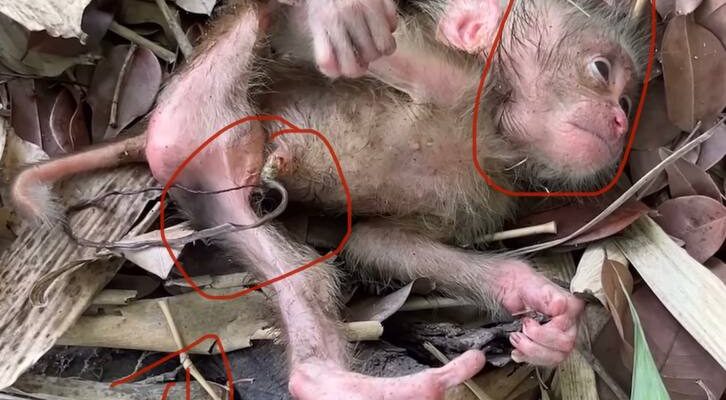Deep in the heart of a dense tropical forest, where sunlight struggles to pierce through the towering trees, a tiny newborn monkey clings to a damp branch. His name is unknown, and his cries echo into the wilderness, answered only by the rustle of leaves and distant calls of creatures unseen. He is alone—his mother, his only source of warmth and nourishment, is gone.
Born just days ago, the little monkey had barely opened his eyes when fate intervened. A sudden predator attack scattered his troop, and in the chaos, his mother—his lifeline—did not survive. Her still body lay in the underbrush as the baby, too young to understand death, reached out in confusion and fear. Hours passed. Then a day. The cries became weaker, the hunger sharper.
In the animal kingdom, survival depends not just on strength but on connection. Infant monkeys rely entirely on their mothers for food, warmth, and protection. Without her, this newborn faced overwhelming odds. He lacked the ability to forage, to defend himself, or even to move through the trees safely. Yet somehow, he endured.
Driven by instinct and desperation, he stayed near the last place he saw his troop. He mimicked the sounds of his kind, hoping for a response. Occasionally, a rustle in the trees would make his tiny heart race—was it another monkey? A predator? Most times, it was nothing. But his will to live kept him alert.
Nature is cruel, but not always heartless. One afternoon, a female monkey from a nearby troop, hearing the baby’s soft whimpers, approached cautiously. She was not his mother. She had no obligation to help him. Yet something stirred in her. Perhaps she had lost a baby once. Perhaps she simply responded to the universal cry of the helpless. Against the odds, she cradled the infant and carried him with her.
This act of compassion gave the baby a second chance. Though he was never truly accepted as one of her own, he was tolerated, fed occasionally, and allowed to stay close. He learned quickly—watching, listening, mimicking. Every day was a test, every branch a risk, every fruit a small victory.
Months passed. The once-fragile infant grew stronger, more agile. Though smaller than the others his age, he adapted. His early suffering had carved into him a deeper awareness. He stayed close to the edges, cautious, observant. He learned not just how to survive—but how to listen to the forest, how to sense danger, and how to stay invisible when needed.
The story of this poor newborn monkey is not just about loss—it’s about resilience. It reminds us that even in the wildest, harshest corners of the earth, life finds a way. Through instinct, chance, and sometimes the kindness of others, survival is possible.



